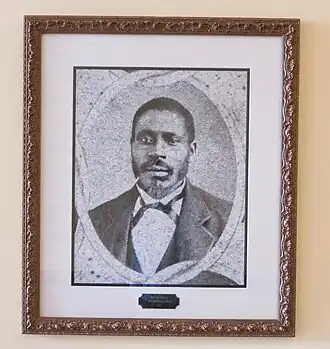Walter Moses Burton
Walter Moses Burton | |
|---|---|
 Walter Moses Burton, Texas state senator, 1874–1883 | |
| Member of the Texas Senate from the 17th district | |
| In office April 18, 1876 – January 9, 1883 | |
| Preceded by | Jewett H. Davenport |
| Succeeded by | John Johnson |
| Member of the Texas Senate from the 13th district | |
| In office February 20, 1874 – April 18, 1876 | |
| Preceded by | Francis J. Franks |
| Succeeded by | Robert S. Guy |
| Personal details | |
| Born | August 9, 1840 North Carolina, U.S. |
| Died | June 4, 1913 Richmond, Texas, U.S. |
| Resting place | Morton Cemetery |
| Political party | Republican |
| Residence(s) | Fort Bend County, Texas |
| Occupation | Farmer |
Walter Moses Burton (August 9, 1840 – June 4, 1913) was a farmer, sheriff, and Republican politician who served four terms in the Texas State Senate.
Born into slavery in North Carolina in 1840, Burton was brought to Texas about 1850. His enslaver, Thomas Burke Burton, a plantation owner in Fort Bend County, taught him to read and write. After Emancipation, Thomas Burton sold Walter Burton several large plots of land for $1,900 (equivalent to $37,655 in 2025), and this made Walter Burton one of the wealthiest landowners in the county.[1]
In 1868, Burton married Abby "Hattie" Jones.[2] She was a well-known figure: in 1871, she survived being thrown from a moving train after refusing to leave the "Whites only" car.[3]
Burton became active in Republican politics and in 1869 he was elected as the sheriff and tax collector in Fort Bend County. He was the first Black elected sheriff in the United States. Burton served as sheriff for four years.
From 1874 to 1875 and 1876 to 1882, Burton served as a Texas state senator in a district that included Fort Bend, Austin, Waller, and Wharton counties.[2][3] As a senator, he championed Black education and worked with state Representative William H. Holland to pass a bill founding Prairie View Normal School (now Prairie View A&M University).[1][4] He also advocated for sensible gun control and the end of convict leasing.[1]
After leaving office, he returned to farming, but continued to be active in the Republican party until his death in 1913. He is buried in the Morton Cemetery in Richmond, Texas.[2]
In 1992, the Texas Historical Commission erected a marker at his grave.[5] In 1996, Fort Bend Independent School District named an elementary school in his honor.[6]
See also
- Jaybird-Woodpecker War
- African American officeholders from the end of the Civil War until before 1900
References
- ^ a b c "The Illuminating History of Walter Burton, America's First Black Sheriff". Atlas Obscura. Atlas Obscura. Retrieved August 21, 2025.
- ^ a b c Pitre, Merline. "Walter Moses Burton: Pioneering Black State Senator of Texas". Handbook of Texas. Texas State Historical Association. Retrieved August 21, 2025.
- ^ a b Hurd, Michael (June 24, 2021). "Unveiling the Stories of Black State Senators in Post-Civil War Texas". Texas Highways. Retrieved August 21, 2025.
- ^ "Forever Free, 19th Century African-American Legislators and Constitutional Convention Delegates of Texas: The 1880s: Walter M. Burton". Texas State Library and Archives Commission. Retrieved August 21, 2025.
- ^ "Walter Moses Burton (August 9, 1840 - June 4, 1913)". The Historical Marker Database. Retrieved August 21, 2025.
- ^ "About WBE: Walter Moses Burton History". Walter Moses Burton Elementary. Fort Bend ISD. Retrieved August 21, 2025.
External links
- Texas Legislators: Past & Present - Walter Burton
- Findagrave - Walter Moses Burton
- Walter Moses Burton (1829?-1913)